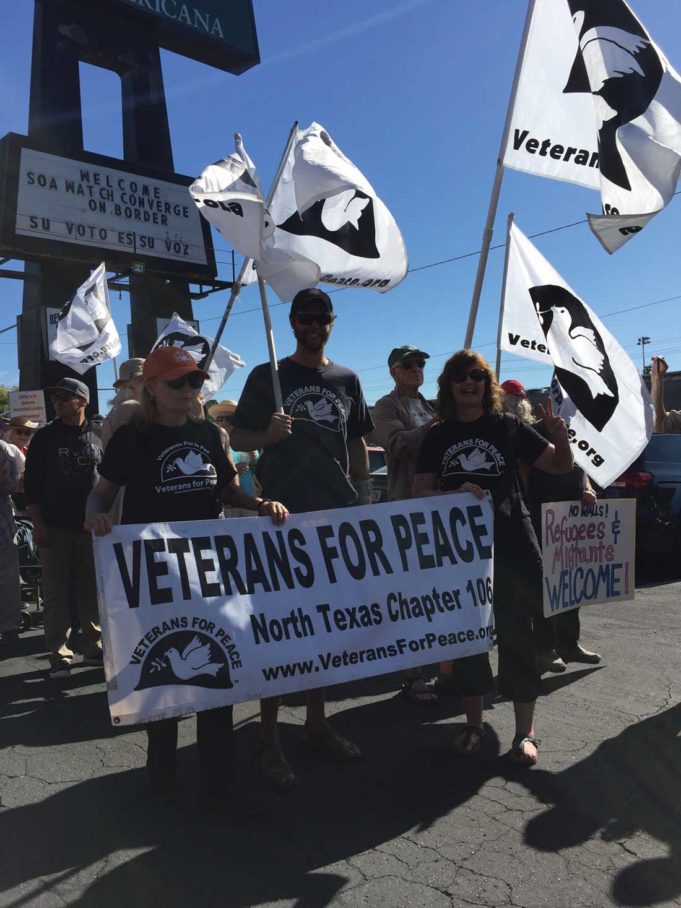In the desert between Nogales and Tucson, Ariz., the remains of three to five people are being found every week.
“And that’s too damned many,” said Richard Miller, a Dallas high-end homebuilder and activist. “Somebody has to bring that to the attention of the public, because that’s unacceptable.”
I was talking with him about an event later this week called Border Encuentro (Border Encounter). Grassroots activists from the Mexican side of the border at Nogales will meet with activists on the United States side to hold workshops, forums, protests, and vigils. The event is produced by School of the Americas Watch, a grassroots group that has long protested against the military base in Fort Benning, Ga., that is home to the School of the Americas. The protest group is angry that U.S. personnel there have trained generations of ruthless dictators — from Panama’s Manuel Noriega to Bolivia’s Hugo Banzer — and future military leaders of Central and South American countries.
Last year SOAW turned its attention to the immigration issue, which it sees as a direct result of the United States’ militarizing countries and communities throughout the southern Americas.
“We moved our protest to the border to uplift the voices of the people who have been working at ending the militarization of Latin America, the imprisoning of migrants, and the treatment of refugees,” said Eduardo Garcia, SOAW’s media liaison. “The Encuentro is a space of resistance. It’s a place where human rights groups, immigration rights groups, labor groups, and LGBTQ organizations can listen and learn from their friends in Latin America. What we are aiming for is to instruct people in the ways we can resist the militarization of the borders, the militarization of our communities, and the U.S. economic intervention in the Americas.”
Miller, 39, is part of the small North Texas contingent going to the Encuentro event. For him, attending the three-day meeting is personal because he is completely dependent on migrant labor.
“I’d be out of business without them,” he said. “The whole homebuilding industry is dependent on Hispanic migrant labor because there are not enough skilled non-Hispanic laborers to build a house.”
Among other North Texans headed to the Encuentro is former Fort Worth State Rep Lon Burnam. The two are old friends. They met at a Quaker meeting in Dallas, Miller said.
“I was going to the Quaker meetings, and Lon came in and gave a talk to try to get another Quaker to take a seat on the board of the Dallas Peace Center, which is an umbrella support center for peace and justice causes in DFW,” Miller said. “So I did. And we struck up a friendship. We used to call ourselves the drinking Quakers back in the days when I was drinking.”
For Burnam, going to the Encuentro is personal as well.
“I’m a pacifist, and I think that any self-declared pacifist has an obligation to pursue justice,” he said. “I was raised in a traditional Christian church that talked about Jesus’ preference for the poor, and I think that’s the way you are supposed to lead your life. That’s the reason I was involved with the migrant farm workers back in the 1980s and was active with the Sanctuary movement in Fort Worth. And that’s the reason I have to go back to the border for this national event.”
Burnam said that one of the events that struck him deeply at last year’s Encuentro was visiting the South Side Presbyterian Church in Tucson, which founded the Sanctuary Movement in the 1980s and continues to work with undocumented migrants.
“The day we were there, instead of serving the traditional communion, the congregants each took a stone on which the children of the church had painted the names of people who had died in the desert around Tucson,” he said. “They each then solemnly and in procession took a stone and put it at the base of their cross in the church courtyard to commemorate the martyrs of their empire.”
The trip from Nogales to Tucson can take five days or more on foot in a brutal desert. Many illegal immigrants seeking work don’t make it. Between September 30, 2016, and October 1, 2017, the remains of 147 people were found, and it’s probable that many more remains were undiscovered.
“I’ve heard a lot of the stories of the difficulty people had in getting here over the years,” Miller said. “And a lot of them were hardcore. One of my painters stood in a diesel tanker up to his ankles in diesel fuel for 24 hours as it came across the border. Another guy I used to work with came over when he was about 15, and one of the coyotes [the people who help migrants cross the border] sexually assaulted him — just part of the payment for coming here.”
And they were the lucky ones. The ones who don’t make it generally die of hyperthermia, or overheating from dehydration. That issue is being mitigated a little by Humane Borders, a group that has set up and maintains 55-gallon water stations between the border and Tucson on known migrant routes where people are dying, Miller said.
“I really hope we’ll make connections with some of the water station volunteers,” he said. “It’s a direct service opportunity.”
Miller and Burnam said that as bad as things have been for illegal immigrants in the past, they have become considerably worse since Donald Trump took office.
“Under Trump’s leadership, he shut down the program that was designed to allow non-accompanied children who arrive at the border fleeing violence to apply for refugee status,” Miller said. “What would it take for you to send your child, unaccompanied, to another country? How bad would it have to be for you to do that? And then Trump shut that program down two months ago. Unbelievable.”
Burnam bristles when he talks about the treatment of migrants fleeing horrific conditions in their homelands. Hating someone in that position just because they are poor or ethnic is “morally wrong,” he said
“We need to work on behalf of these indigenous poor,” he said. “Our national policies with regard to these people are reprehensible, immoral, and counterproductive.”
Miller takes it personally because he feels he maintains a closer relationship with the migrant community than most people do.
“Our current immigration policy is out of line with our own self-interest,” he said. “This group of people has not earned the disrespect of our policy toward them. … In any way that I can be helpful to these people –– people who have earned their place here with daily hard work –– I will be.”
Border Encuentro runs from Friday to Sunday. Attendance at last year’s inaugural event topped 2,000 and is expected to draw a higher number this year, according to SOAW’s Garcia.
“This situation was bad long before Trump got elected,” Garcia said. “But it has gotten worse.”
While the North Texas contingent does not expect things to change overnight just because of a few days of rallying and protests, Miller thinks it’s vital to be there.
“I think of myself as a Southern hick, and I think my presence standing with this group of people is important,” he said. “To have a large group of people show up at immigration checkpoints to let Homeland Security and the Border Patrol know that these people will not be treated with disrespect, well, that’s an important message to send. And I think you need people who are not brown in that group to let people know they are not alone.”













That’s right, the corrupt construction industry has been hiring cheap illegal labor for so long that all the American workers have literally been driven out of their jobs. Is that really that hard to understand? Deport them and build the border wall!
The ones I know get paid well and do great work. Why is it our ancestors came here to get a life, but we’re now too selfish to let others come? Obviously we’re not a Christian nation.
Don’t even try to suggest that Americans aren’t willing or able to work construction jobs! Back in the early ’80’s during the housing building boom in Plano and beyond, almost every single construction crew, from framer to painter, was an American. Some left because of the downturn in the ’90’s but most did because contractors started hiring cheap, undocumented workers who worked for less money because they were here illegally. I know this first hand. While Miller may not have created the so-called “shortage” of skilled workers he certainly is perpetuating the problem and is working very, very hard to protect his supply of cheap labor!